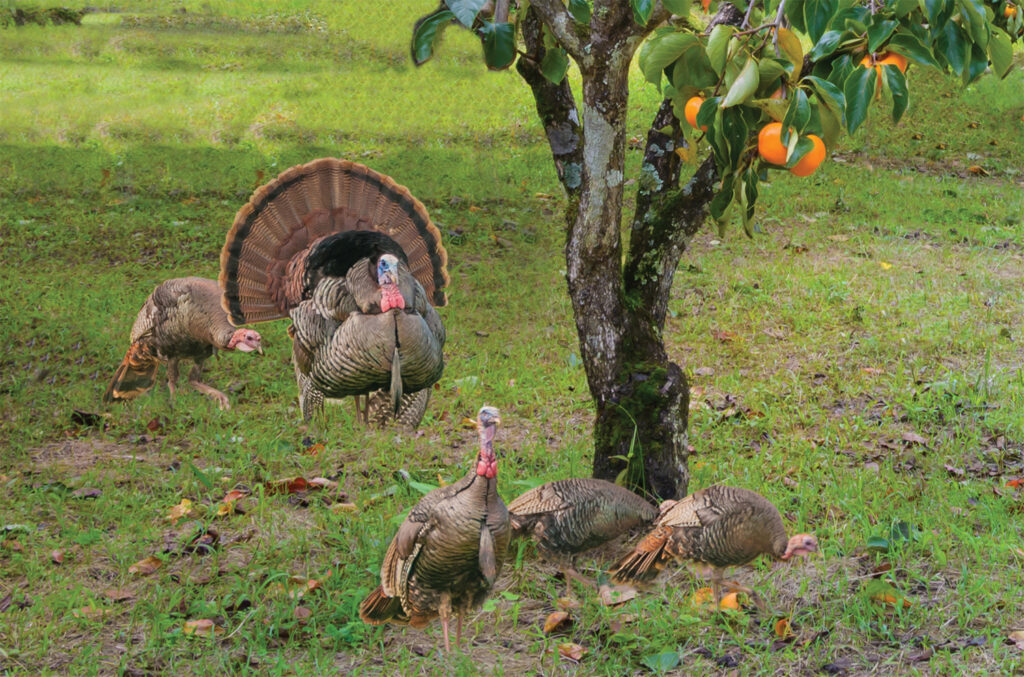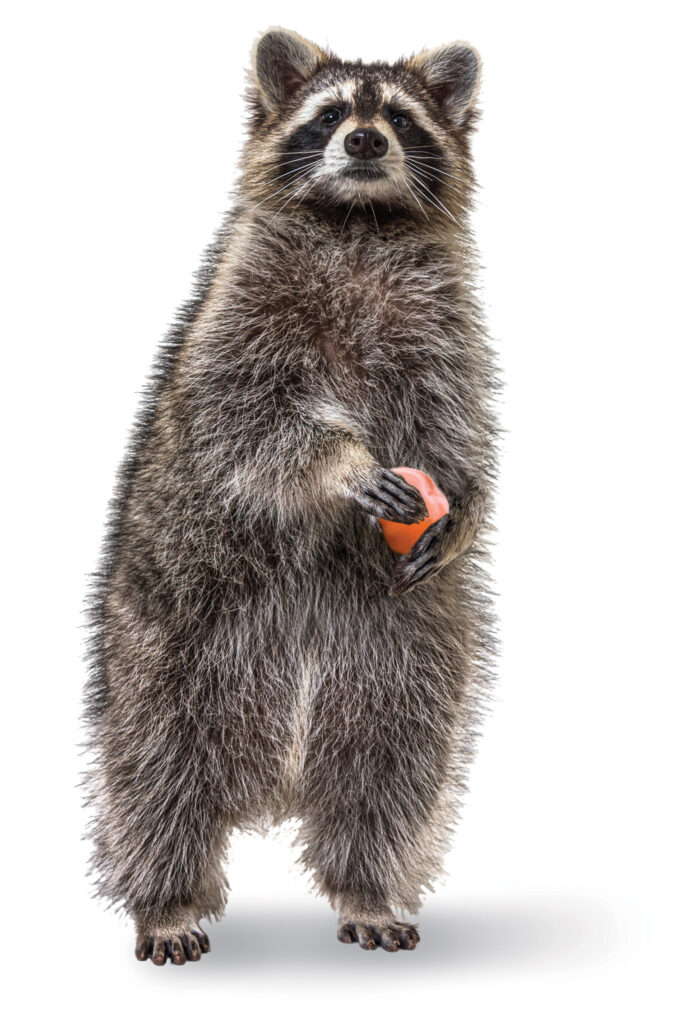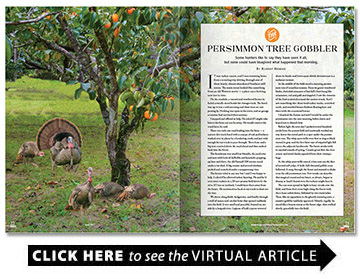The Persimmon Tree Gobbler
Some hunters like to say they have seen it all, but none could have imagined what happened that morning.
BY Robert Rehder

It was turkey season, and I was returning home from a scouting trip driving through one of those lonely, almost-abandoned Southern mill towns. The main street looked like something from an old Western movie — a place once thriving, now lost in time.
On the roadside, a tanned and weathered farmer in faded coveralls stood beside his vintage truck. The hood was up; it was a cold morning and there were no cars passing by. Nothing was open in the town, and no garage or station had survived there anyway.
I stopped and offered to help. He asked if I might take him to his farm not too far away. He would retrieve the truck later, he said.
There was only one road leading into the farm — a narrow dirt track lined with a canopy of oak and hickory, washed over in places by a bordering creek, and just wide enough for my truck to pass through. Three hens and a big tom scurried down the road ahead and then melted back into the forest.
The farmhouse was small but friendly, the yard trim and neat with beds of daffodils and hyacinths popping up here and there. An old Farmall 230 tractor stood under a tin shed. A big rooster and several chickens pecked and scratched under a scuppernong vine.
The farmer tried to pay me, but I said I was happy to help. I asked if he allowed turkey hunting. He said he’d seen some turkeys in a 20-acre peanut field down by the river. If I was so inclined, I could hunt there away from the house. He motioned me back to my truck to show me the way.
We drove along fields, hedgerows, and finally through a wall of sumac and catclaw brier that opened suddenly into the field. It was small and peaceful, framed on one side by a languid river. Legions of bald cypress towered above its banks and leaves spun slowly downstream in a molasses current.
In the middle of the field stood a stunning persimmon tree of countless seasons. From its gaunt weathered limbs, shriveled remnants of last fall’s fruit hung like ornaments, red and gold and dappled. I saw the remains of the fruit scattered around the ancient trunk. And I saw something else: three-toed turkey tracks, scratched earth, and mottled bronze feathers floating here and there with the occasional breeze.
I thanked the farmer and said I would be under the persimmon tree the next morning before dawn and hoped not to disturb him.
Before light the next day I parked several hundred yards from the peanut field and cautiously worked my way down the rutted path to a spot under the persimmon tree. The whip-poor-wills were first to sing as black turned to gray and the first faint rays of stippled light fell across the adjacent hardwoods. The forest awoke with its myriad sounds of spring. Canada geese flew the river course and wood ducks squealed from their swampy bogs.
As the whip-poor-wills ceased, a hen sent out the first of several soft yelps. A bold, full-throated gobble soon followed. It rang through the forest and seemed to shake even the old persimmon tree. Few words can describe that magical sound and my heart, as always, began to thump so loud I feared even the turkeys might hear it.
The sun soon spread its light in hazy streaks over the field, and from their roost high along the forest wall, three hens sailed down, followed by two timid jakes. Then, like an apparition in the ghostly morning mist, a massive gobbler suddenly appeared. Silently, regally, he stood like a bronze statue at the forest edge, then walked slowly, gracefully into the field.
His full-strut fan was iridescent, his chest shimmered deep gold and blue, and the bars of his wings flashed in the glow of dawn. Straight for the persimmon tree he came, and once more he boomed the deep, boisterous gobble that echoed through the woods and down along the river. The hens and jakes were in range, but the old tom was still at 75 paces and slowly advancing. My gun was up, I was fully hidden, and I had not moved a muscle, expecting to squeeze off the shot at any moment.
Then it happened. The curse of all turkey hunters. The lead hen went on alert and gave a sharp warning “putt” that stopped the gobbler in his tracks just out of range! I knew I had not moved, but something had alarmed the hen and the gobbler was staring me down.
Minutes passed that seemed like hours, but the big tom in all his splendor just stood there. If I live another lifetime, I could never again imagine what happened next.
I became aware of a muted chattering sound that I thought was coming from the hens, but then I realized it was coming from behind me. Like a tack in a bulletin board, the gobbler had me pinned to the persimmon tree. I dared not move or I would spook him, so I could not turn to see what made the strange muttering sounds approaching from my blind side.
Then the chattering was closer — around and above me it seemed — with an audible scratching sound against the tree trunk. Still the big tom stared, and I could not move to see the source of those maddening sounds.
I imagined it was a huge, hungry snake crept up from the river’s depths into the tree, or a bobcat or bear about to attack me. Then, as if in a scene from some strange movie, little pieces of seeds, twigs and bark began to float down. That was the last straw. Fearing for my life, I eased my shotgun up and raised my head to face the unseen monster above.
Smacking and chattering, the comical faces of five fat raccoons stared down at me, their ringed, bushy tails wagging, there to feast on the remains of last year’s bountiful crop. Monsters indeed!

Surely as surprised to see me as I was to see them, they squawked and squealed and came tumbling, almost as one, down the tree, falling all over me and each other, hissing and spitting — leaves, branches and fruit flying everywhere! They hit the ground running and high-tailed it back to their home in the woods.
From ringside seats, the hens and jakes saw the fray and flushed to the four winds. The magnificent tom, still at 70 yards, turned slowly, majestically, and walked back into the deep forest, showing his displeasure with a final, defiant, roaring gobble that haunts me still.
As quickly as it started, the hunt was over. Silence fell across the forest. The gobbler, after observing the raucous morning comedy, was likely headed for the next county. I had to laugh as I sat there, shotgun idle across my lap, shaking my head in disbelief, wondering what just happened.
Hickory smoke rose in a single fragrant plume from the farmhouse. I stopped on the way out to thank the farmer, and he invited me in for coffee. When I told him the ridiculous story, he chuckled and said most everything in the forest loved that old tree, raccoons especially, but I was welcome to try again.
I struck up a lasting friendship with him and hunted the peanut field twice more that season. But the beautiful persimmon tree gobbler got the last laugh because I never saw him again.

